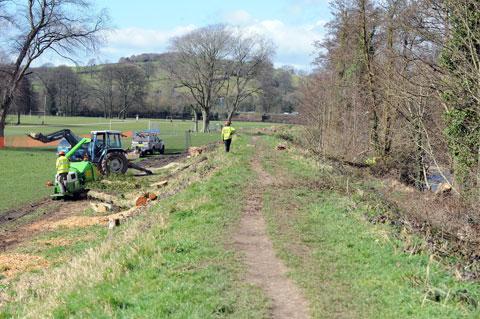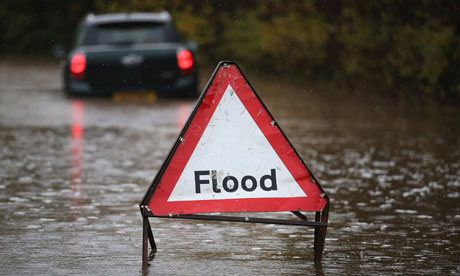 |
| Remember when there was talk of droughts last April? (Pic : BBC Wales) |
Wales has been battered
by heavy rain and flooding over the last six months. I don't think
there are any parts of the country that have escaped disruption over
that period - Bridgend town itself looked perilously close to flooding just before Christmas. It's badly affected rail services,
caused landslips and has damaged hundreds of homes and businesses.
The three stand-out flooding events have been Ceredigion and Powys in June 2012, Denbighshire in November 2012 and the aforementioned flooding last month, which affected south Wales particularly severely and still ongoing in some areas.
There's no such thing as "bad weather" really, just bad responses to it.
We're used to rain and some flooding as a residential hazard of living in Wales, but what were "once every 50 year events" are becoming "twice/thrice a decade" events. Climate change will inevitably be blamed - and I'm not going to debate the causes here. However, shifts in the North Atlantic jet stream – which has contributed to the rainfall - are (relatively) predictable, although those shifts are likely to happen more often with climate change.
I think (perhaps many others too) the one reason flooding is becoming perceiveably more common is past and present building on flood plains.
As most flat, developable land in Wales is alongside rivers, you can't blame developers for eyeing it up. But building too many houses right next to rivers without providing extensive flood protection is negligent. It's also negligent to plan for/allow too many houses in these areas. It's probably negligent to move next to a river or stream never expecting it to flood, as is a failure to keep streams and brooks clear of debris.
Llyr Huws Gruffydd AM (Plaid, North Wales), recently called for the establishment of a Flood Action Forum for Wales. England has a National Flood Forum, while Scotland has Community Flood Action Groups. The organisation would be an advocate for flood victims, help promote flood prevention and help plan flood defences. I'm actually surprised Wales doesn't currently have one.
There are other, seedier, effects. Ann Jones AM (Lab, Vale of Clwyd) recently warned of doorstep loan sharks taking advantage of flood victims in Denbighshire. As to what I think of those sharks, insert strong epithet. Sounds like "runts".
The Welsh Government has flood action plans and strategies, and works with the Environment Agency and Dwr Cymru to plan flood defences out of its capital budget alongside water management.
The (Welsh) Environment Agency is due to merge with the Countryside Council for Wales and Forestry Commission to form Natural Resources Wales in April. I doubt that will affect the flood protection programme, but obviously merging three large bodies like that could cause administrative problems for the sheer scale of it.
It also doesn't help that the Welsh Government are cutting £30million in capital spending on flood defences over the next four years. That could blemish their – to date - decent record on the environment.
As all things, prevention is the best cure – stop building on flood plains, or at the very least, where flood plains need to be built on, provide extensive flood protection. That could become a statutory requirement as part of planning reforms, or form part of Section 106 agreements.
The Welsh Conservatives included the creation "Blue Belts" in their 2011 manifesto, maybe it's time for the Welsh Government to consider that in any sustainable development or planning bills. If any of these things make a development site "unviable", then developing such a site in the first place should be reconsidered.
By extensive flood protection I mean :
The three stand-out flooding events have been Ceredigion and Powys in June 2012, Denbighshire in November 2012 and the aforementioned flooding last month, which affected south Wales particularly severely and still ongoing in some areas.
There's no such thing as "bad weather" really, just bad responses to it.
We're used to rain and some flooding as a residential hazard of living in Wales, but what were "once every 50 year events" are becoming "twice/thrice a decade" events. Climate change will inevitably be blamed - and I'm not going to debate the causes here. However, shifts in the North Atlantic jet stream – which has contributed to the rainfall - are (relatively) predictable, although those shifts are likely to happen more often with climate change.
 |
| The excess rain is likely to have been caused by shifts in the North Atlantic jet stream. Is excess building on flood plains making flooding worse than it otherwise would be? (Pic : BBC) |
I think (perhaps many others too) the one reason flooding is becoming perceiveably more common is past and present building on flood plains.
As most flat, developable land in Wales is alongside rivers, you can't blame developers for eyeing it up. But building too many houses right next to rivers without providing extensive flood protection is negligent. It's also negligent to plan for/allow too many houses in these areas. It's probably negligent to move next to a river or stream never expecting it to flood, as is a failure to keep streams and brooks clear of debris.
Llyr Huws Gruffydd AM (Plaid, North Wales), recently called for the establishment of a Flood Action Forum for Wales. England has a National Flood Forum, while Scotland has Community Flood Action Groups. The organisation would be an advocate for flood victims, help promote flood prevention and help plan flood defences. I'm actually surprised Wales doesn't currently have one.
There are other, seedier, effects. Ann Jones AM (Lab, Vale of Clwyd) recently warned of doorstep loan sharks taking advantage of flood victims in Denbighshire. As to what I think of those sharks, insert strong epithet. Sounds like "runts".
The Welsh Government has flood action plans and strategies, and works with the Environment Agency and Dwr Cymru to plan flood defences out of its capital budget alongside water management.
The (Welsh) Environment Agency is due to merge with the Countryside Council for Wales and Forestry Commission to form Natural Resources Wales in April. I doubt that will affect the flood protection programme, but obviously merging three large bodies like that could cause administrative problems for the sheer scale of it.
It also doesn't help that the Welsh Government are cutting £30million in capital spending on flood defences over the next four years. That could blemish their – to date - decent record on the environment.
As all things, prevention is the best cure – stop building on flood plains, or at the very least, where flood plains need to be built on, provide extensive flood protection. That could become a statutory requirement as part of planning reforms, or form part of Section 106 agreements.
The Welsh Conservatives included the creation "Blue Belts" in their 2011 manifesto, maybe it's time for the Welsh Government to consider that in any sustainable development or planning bills. If any of these things make a development site "unviable", then developing such a site in the first place should be reconsidered.
By extensive flood protection I mean :
- Concrete walls/flood barriers
- Redirection of rivers and streams
- Levees/Dykes/Embankments
- Fines/prosecutions for not adequately maintaining watercourses
 |
| Are more extensive flood defences required in large parts of Wales? Will they need to be funded by developers? (Pic : South Wales Argus) |
We also need to consider flood preparation and emergency planning. Concerns were recently raised by the Wales Audit Office about the Welsh Government's responses to civil emergencies.
Some of the criticisms seem a little unfair to be honest. I think the Welsh Government, emergency services and local authorities do a good job in emergencies. Most of the criticism stems from confused boundaries when it comes to responsibilities – so more administrative than practical.
I believe a major issue there is that flood warnings are never taken seriously enough by the media or the public.
Once an emergency becomes apparent, the media are quick to provide extensive coverage – especially local radio and via Twitter feeds etc. But in the period building up to an emergency, they seem reluctant to point out the seriousness of a situation, perhaps in fear of "crying wolf". People usually only take action when it's too late or when a situation becomes life-threatening.
 |
| Does the flood warning system in Wales - and elsewhere - need another revamp? (Pic : floodwarn.co.uk) |
I've mentioned an "emergency alert system" before. I think warnings - not just for flooding but all sorts of severe weather (and perhaps missing children too - aka "Amber Alert") - are going to have to become more invasive. Yes, that means interrupting TV and radio programmes if necessary, perhaps even an expansion of text messaging services that the Environment Agency already provide.
This doesn't need to be Wales-only. It can't anyway as broadcasting isn't devolved. But maybe it's something the UK Government can re-visit. If the climate is going to get rougher over the coming decades, then the public need to be more aware – or at the very least treat a changing climate and severe weather as an immediate danger.
It should also mean greater use of the military (in particular Territorial Army units) in emergency preparations as and when required. It's supposed to be a "Ministry of Defence" after all. How can the UK spend £35billion on defence every year, yet not properly protect its own citizens from excess rainfall?











Very interesting
ReplyDelete